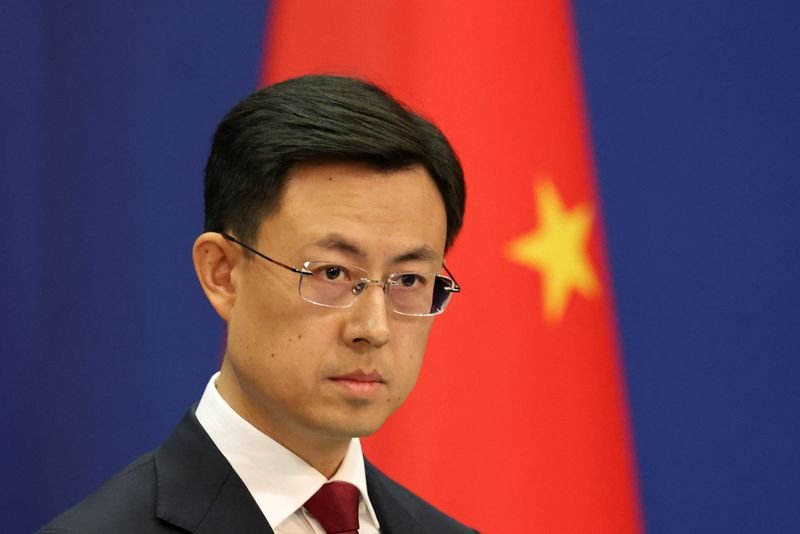China on Wednesday bluntly rebuffed U.S. proposals for trilateral nuclear arms management negotiations with the U.S. and Russia, labeling the request “unreasonable and unrealistic.” The assertion, issued by Overseas Ministry spokesman Guo Jiakun, underscores Beijing’s steadfast refusal to enter into talks perceived to neglect elementary variations in nuclear functionality and technique.
Guo emphasised a stark imbalance in nuclear power and diverging safety insurance policies between China, the U.S., and Russia. “The nuclear forces of China and america usually are not on the similar degree in any respect,” he mentioned, pointing to China’s “no first use” doctrine and coverage of self-defense. Guo insisted that the “international locations with the most important nuclear arsenals” — a transparent reference to Washington and Moscow — bear a major accountability for disarmament.
The feedback got here in response to remarks by President Donald Trump, who, following discussions with Russian President Vladimir Putin, expressed hopes that China would be part of efforts towards world denuclearization. “One of many issues we’re attempting to do with Russia and with China is denuclearization, and it’s crucial,” Trump advised reporters forward of a gathering with South Korean President Lee Jae Myung. He added, “We will’t let nuclear weapons proliferate. We have now to cease nuclear weapons.”
Trump’s push displays the urgency of discussions surrounding the expiry of the longstanding New START treaty in February 2026. The U.S. hopes that Chinese language participation might broaden the momentum towards limiting nuclear arsenals, at the same time as Beijing continues its personal modernization efforts.
Analysts say China’s refusal is rooted in important structural imbalances. Beijing’s nuclear arsenal—estimated at only some hundred warheads—is dwarfed by U.S. and Russian holdings, which collectively account for roughly 87% of world nuclear weapons. Trilateral limitations with out adjusting for this discrepancy would solidify one-sided dominance.
China’s place echoes prior diplomacy: in 2020, Beijing said it might solely be part of multilateral arms management efforts if the U.S. and Russia lowered their stockpiles to ranges akin to China’s. At the moment, a senior arms management official dismissed the U.S. invitation as “nothing however a ploy to divert consideration.”
Coverage analysts argue that China’s cautious angle stems not solely from functionality variations, but in addition from strategic prudence. Coming into into binding agreements might constrain Beijing whereas failing to supply reciprocal concessions. In accordance with commentary within the official Chinese language navy publication, arms management consultations shouldn’t be conflated with formal negotiations—China favors casual dialogue over commitments that might hamper autonomy.
In the meantime, Russia has additionally deemed the thought of together with China in disarmament talks “unrealistic,” reinforcing the view that trilateral frameworks might not mirror geopolitical realities.
President Trump is tying his renewed push for trilateral talks to broader diplomatic initiatives, together with his efforts to rekindle denuclearization dialogue with North Korea and solidify submit–New START agreements. In February, he mentioned he needed to scale back protection budgets with each Beijing and Moscow, calling runaway nuclear spending “extreme.”
China’s rejection, nonetheless, extends past nationwide nuclear coverage. Beijing continues its modernization program and not too long ago reaffirmed its “no first use” stance. On the similar time, U.S. protection analysts word indicators that China is making ready a launch-on-warning posture for a few of its nuclear belongings, reflecting issues over advancing missile protection capabilities.
Such developments gasoline U.S. suspicions whereas complicating arms management articulation. Though China has advocated for no-first-use amongst nuclear-armed states and for abolishing alliances like NATO’s nuclear sharing preparations, different P5 nations have been skeptical of the intent behind these proposals.
Because the February 2026 sundown of New START attracts close to, Washington is more and more anxious about extending the treaty or securing a successor framework—ideally with broader participation. Nonetheless, China’s stance makes trilateral enlargement unbelievable, setting the stage for renewed confrontation on arms management.
Chinese language officers proceed to name on Washington and Moscow to take the lead, pointing to their considerably bigger arsenals and lengthy historical past of escalation. The problem now’s whether or not bilateral and multilateral efforts may be reconciled—significantly as geopolitical competitors intensifies. Selling a secure nuclear order might rely on inventive diplomacy, confidence-building, and addressing strategic asymmetry between established and rising nuclear powers.


